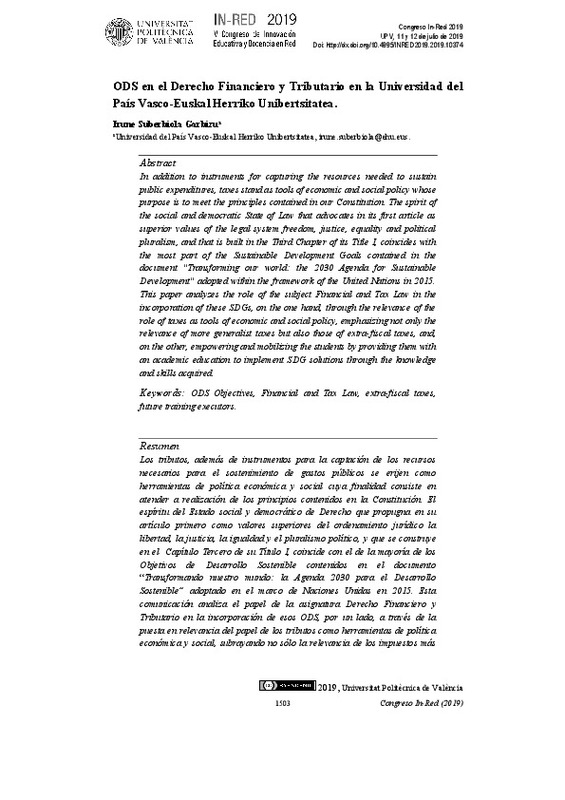JavaScript is disabled for your browser. Some features of this site may not work without it.
Buscar en RiuNet
Listar
Mi cuenta
Estadísticas
Ayuda RiuNet
Admin. UPV
ODS en el Derecho Financiero y Tributario en la Universidad del País Vasco-Euskal Herriko Unibertsitatea
Mostrar el registro completo del ítem
Suberbiola, I. (2019). ODS en el Derecho Financiero y Tributario en la Universidad del País Vasco-Euskal Herriko Unibertsitatea. En IN-RED 2019. V Congreso de Innovación Educativa y Docencia en Red. Editorial Universitat Politècnica de València. 1503-1513. https://doi.org/10.4995/INRED2019.2019.10374
Por favor, use este identificador para citar o enlazar este ítem: http://hdl.handle.net/10251/129047
Ficheros en el ítem
Metadatos del ítem
| Título: | ODS en el Derecho Financiero y Tributario en la Universidad del País Vasco-Euskal Herriko Unibertsitatea | |
| Autor: | Suberbiola, Irune | |
| Fecha difusión: |
|
|
| Resumen: |
[EN] In addition to instruments for capturing the resources needed to sustain
public expenditures, taxes stand as tools of economic and social policy whose
purpose is to meet the principles contained in our Constitution. ...[+]
[ES] Los tributos, además de instrumentos para la captación de los recursos necesarios para el sostenimiento de gastos públicos se erijen como herramientas de política económica y social cuya finalidad consiste en atender ...[+]
|
|
| Palabras clave: |
|
|
| Derechos de uso: | Reconocimiento - No comercial - Sin obra derivada (by-nc-nd) | |
| ISBN: |
|
|
| Fuente: |
|
|
| DOI: |
|
|
| Editorial: |
|
|
| Versión del editor: | http://ocs.editorial.upv.es/index.php/INRED/INRED2019/paper/view/10374 | |
| Título del congreso: |
|
|
| Lugar del congreso: |
|
|
| Fecha congreso: |
|
|
| Tipo: |
|








